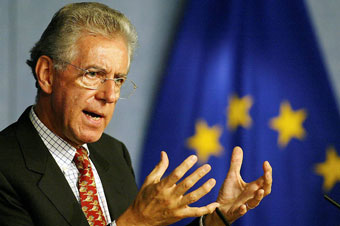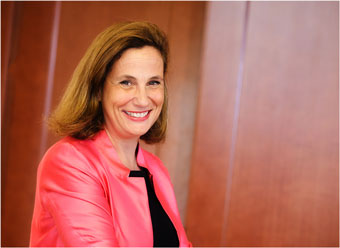
European geoscientists recently called for integration and cooperation between member states of the European Union (EU) to benefit global scientific research and progress.
At a 10 April session at the European Geosciences Union (EGU) General Assembly 2019 in Vienna, Austria, scientific and political leaders spoke about mounting threats to scientific progress and how a lack of European unity could damage research and researchers alike.
The looming specter of the United Kingdom’s exit from the EU in October, the rise of populism in the United States and elsewhere, rampant proliferation of fake news, and growing attacks on scientific credibility could interrupt the EU’s “virtuous circle” of economic growth and scientific discovery, according to former Italian prime minister Mario Monti. Monti also served as a European commissioner from 1995 to 2004.
“We may witness an undoing of the formerly virtuous circle into a potentially vicious circle, where the forces at play—followership, short-termism, personal interest, rejection of competence, fake news, fake history, and social media—may bring…authoritarian or slightly more demagogic organizations of power at the national level,” Monti said during the session.
“The next victim, I’m afraid, is going to be you, that is, science,” Monti said, “because there was once upon a time, and there still is, a very virtuous cycle between Europe, European integration, and science.”
Following the conference session, the EGU Council released a statement saying that “the EGU firmly believes that threats to a united Europe are threats to scientific research.”“Populism and science are completely incompatible.”
Decrying Populism“Populism and science are completely incompatible,” virologist Ilaria Capua said during her address. Capua was a member of the Italian Parliament from 2013 to 2016 and is a professor at the University of Florida in Gainesville. “Your decisions or opinions are more linked to your emotions and not to facts. And we know that science doesn’t work like this.”
Populistic politics tries to appeal to average citizens who feel that their concerns are neglected in favor of those of elite groups. This, in and of itself, isn’t bad, Monti said. “In most cases, [populists] point to really existing problems. I happen to believe that in 98% of the cases they come to wrong or impracticable or counterproductive solutions.”
 Mario Monti speaking during a 2003 news conference in Brussels, Belgium, during his time as European commissioner. Credit: danacreilly, CC BY 2.0
Mario Monti speaking during a 2003 news conference in Brussels, Belgium, during his time as European commissioner. Credit: danacreilly, CC BY 2.0
For example, Monti said that populism promotes closing national borders and restricting the outward flow of information as economic conditions worsen domestically. However, doing so also restricts the flow of scientific information, limits researchers’ access to resources and equipment beyond their borders, and stymies scientific developments that might stimulate economic growth.
“To tackle the greatest challenges that we face such as antibiotic resistant bacteria, climate change, energy, food and water security, the scientific community within Europe needs to work together, pooling complementary skills, expertise and infrastructure, and share data and information within an open and unified environment,” according to the EGU statement.
Fighting Attacks on Facts and Science“As a virologist,” Capua said, “I can tell you that I am very, very concerned of the next threat that is going to become viral. And this threat is the fake news threat for science.”
Capua cited the antivaccination movement, protests against necessary animal trials, and misleading information campaigns about disease outbreaks as examples of fake news that directly hinders scientific progress and puts people’s lives at risk.
 Ilaria Capua is a virologist and former member of the Italian Parliament. Credit: Ilaria Capua
Ilaria Capua is a virologist and former member of the Italian Parliament. Credit: Ilaria Capua
“There is an industry out there, ready to make noise about whatever they dislike,” she said. “And this industry has a very clear objective. And the objective is to change opinions and to make money.”
“Despite communication being very easy today, so we have unprecedented opportunities to communicate, misconception and fake news have never been so high as well,” said EGU president Alberto Montanari. “It’s a contradictory setting.”
Moreover, Monti and Capua explained, fake news catches on by using short and catchy—and also inaccurate—descriptions of scientific research, conclusions, or applications. Refuting those 5-second sound bites, Monti said, takes much longer and is not an effective method of defending the benefits of EU integration on science.
Capua has experience with how the fake news machine can personally affect researchers. In 2014, Capua learned that she was the target of a fake news conspiracy theory that accused her of deliberately causing international disease epidemics to profit from patented vaccines. Because of this attack, she faced invasive international investigation, damage to her scientific credibility, and the possibility of life imprisonment. She was cleared of all charges in 2016.
“We cannot lose our credibility. We cannot. We must not.”Her story, she said, is an extreme example of the attacks and gaslighting many climate scientists have faced for more than a decade.
“We were all brought together under one umbrella of European research,” she said. “We need to prepare because attacks will come and we need to develop strategies to maintain our credibility. And we need to find new ways to engage with the public.”
“We cannot lose our credibility. We cannot. We must not,” Capua urged.
Being Vocal Supporters of IntegrationDuring the session, Günter Blöschl, a hydrologist at the Vienna University of Technology and a former EGU president, asked a question that is likely on many scientists’ minds: “What can we as average researchers do to foster integration in our daily work?”
“It’s very simple,” Monti replied. “Be yourself and tell surrounding people who you are and how the EU relates to you and the aspects in your [research] activity.”
“Thanks to the army of European scientists, the scientific advancements of Europe are one of the main products of European integration.”Blöschl told Eos that after the session, Monti added that scientists should also be vocal about the benefits of an integrated Europe for their research. Blöschl said, “My reaction to this is that in simple answers there is often a lot of truth.”
“I believe it is very important to promote Europe with the positives that Europe achieves,” Monti said. “Thanks to the army of European scientists, the scientific advancements of Europe are one of the main products of European integration.”
“And, of course,” he added, “good education is of the essence because otherwise, electors will not make [informed] use of their electoral power, which may correspond to the political system delivering what they really care for.”
What’s at Stake“The economic arguments are clear,” the EGU Council stated. “For every euro invested in research and innovation, the return into the economy is multiplied by between a factor 6 to 8. Beyond the simple economic principles, it is also widely recognised that European Framework programmes provide a unique and critical mechanism for fostering and enabling trans-national collaboration on research and innovation.”
“This is what European research does. It brings together an immense strength, love, and passion that we have in Europe for science.”Capua agrees. “What does European research do?” she asked. “It creates teams. It creates fantastic teams of people who worked together in the same place, or in another place in Europe, or in another place in the world.”
“This is what European research does,” she said. “It brings together an immense strength, love, and passion that we have in Europe for science. And it brings diversity. And this is what is empowered by our European research programs.”
—Kimberly M. S. Cartier (@AstroKimCartier), Staff Writer
from Eos https://eos.org/articles/a-united-europe-benefits-global-science-say-eu-geoscientists?utm_source=rss&utm_medium=rss&utm_content=a-united-europe-benefits-global-science-say-eu-geoscientists
via IFTTT

